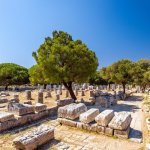My father was born in the US. When he was 5 y/o his family moved back to Greece. He went back to the US just before WW2 and, of course, he was drafted. He spent 4 years in the S Pacific as a combat veteran. He was wounded twice. Initially, upon his return, he could not speak English and so he attended adult ed to learn.
Papou and Yayia returned and lived with us for a few years. I remember Papou smoking his pipe and taking me for daily walks. In 1955, they returned to Greece. I was 7 y/o and I never saw them again. I missed them dearly. Not everything about growing up Greek was great.
After the war, he married a strong Greek woman who along with my maternal Yayia taught me Greek. Ma was born in the US. Greek was my first language and so I became steeped in the Greek culture and fluent in the Greek language as did my 2 brothers. I lived it first hand and loved it. When I went to school I struggled with English so much so that my first grade teacher complained that I did not know my colors. Ma said, "Sure he does. Ask him in Greek." So that was that.
I married a strong wonderful Greek woman who is also fluent though she was born in the US. We have 2 wonderful daughters who spent a semester or 2 studying Greek at UNH. Thank God they have an excellent Greek language program there.
My family is Greek Orthodox and prior to the pandemic we attended an Orthodox church weekly and became very involved in the life of the church. Now we do the best we can through Zoom.
Though I am fluent (4 out of 5 according to my daughter) I never learned to read and write Greek. My wife and I now attend a Greek school at a church, at least we did prior to the pandemic, and so now I can read and write Greek.
So I have come full circle, like my father, who attended English school I have attended Greek school as an adult.
So that's how I grew up Greek in the USA.
Papou and Yayia returned and lived with us for a few years. I remember Papou smoking his pipe and taking me for daily walks. In 1955, they returned to Greece. I was 7 y/o and I never saw them again. I missed them dearly. Not everything about growing up Greek was great.
After the war, he married a strong Greek woman who along with my maternal Yayia taught me Greek. Ma was born in the US. Greek was my first language and so I became steeped in the Greek culture and fluent in the Greek language as did my 2 brothers. I lived it first hand and loved it. When I went to school I struggled with English so much so that my first grade teacher complained that I did not know my colors. Ma said, "Sure he does. Ask him in Greek." So that was that.
I married a strong wonderful Greek woman who is also fluent though she was born in the US. We have 2 wonderful daughters who spent a semester or 2 studying Greek at UNH. Thank God they have an excellent Greek language program there.
My family is Greek Orthodox and prior to the pandemic we attended an Orthodox church weekly and became very involved in the life of the church. Now we do the best we can through Zoom.
Though I am fluent (4 out of 5 according to my daughter) I never learned to read and write Greek. My wife and I now attend a Greek school at a church, at least we did prior to the pandemic, and so now I can read and write Greek.
So I have come full circle, like my father, who attended English school I have attended Greek school as an adult.
So that's how I grew up Greek in the USA.
Last edited:



